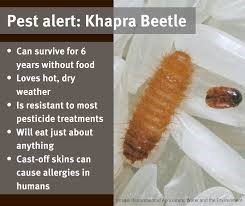We have posted before about the dangers of Khapra Beetle entering Australia, most recently about its detection in this article three months ago.
The pest which has the technical name of Trogoderma granarium is a serious threat found mainly in stored grains, but also in rice, oilseeds and dried foodstuffs. The damage it could cause in Australia cannot be overstated. If the beetle was to establish here, many of our trading partners would simply reject stored produce from Australia. Given that we export much of the grain we grow, the bug could cause devastating losses, affecting the nation’s economy.
Yesterday, 15 November 2021, the Department of Agriculture Water and Environment (DAWE) issued Industry Advice Notice 232-2021: Khapra beetle Phases 4 and 5, and extension of Phase 6A measures. It is directed to the attention of importers, customs brokers, and other operators in the sea container supply and logistics chain, and it updates earlier notices.
Phase 4 will introduce revised phytosanitary certification requirements for other-risk plant products exported from all countries. From early 2022, all other-risk plant must be:
- inspected offshore by government official of exporting country; AND
- certified as being free from any listed species of Trogoderma (whether live, dead or exuviae) in Australia’s list of Trogoderma species of biosecurity concern.
Phase 5 will introduce phytosanitary certification requirements for seeds for sowing exported from all countries and arriving via all arrival modes. These conditions will apply to:
- unaccompanied personal effects, baggage carried by international travellers (including crew) entering via sea or air (excluding high risk species that are banned as part of Phases 1 and 2)
- high value and low value air freight and sea freight (excluding high risk species imported for personal use as low value freight that are banned under Phase 1)
Extension of Phase 6A measures:
Mandatory offshore treatment requirements already exist for FCL/FCX containers packed with all types of goods in a khapra beetle target-risk country and destined to be unpacked in a rural grain growing area of Australia. This requirement is now extended to include containers destined for unpack in rural nut growing areas of Australia. This will come into effect for containers exported on or from 15 December 2021.
For updated, correct information about your import and export shipping, contact us here at Colless Young. As licensed Customs Brokers and International Freight Forwarders, we offer professional service and advice on all your international cargo requirements. Colless Young provides a complete range of logistics services, both air and sea cargo, at all major Australian ports and airports.

